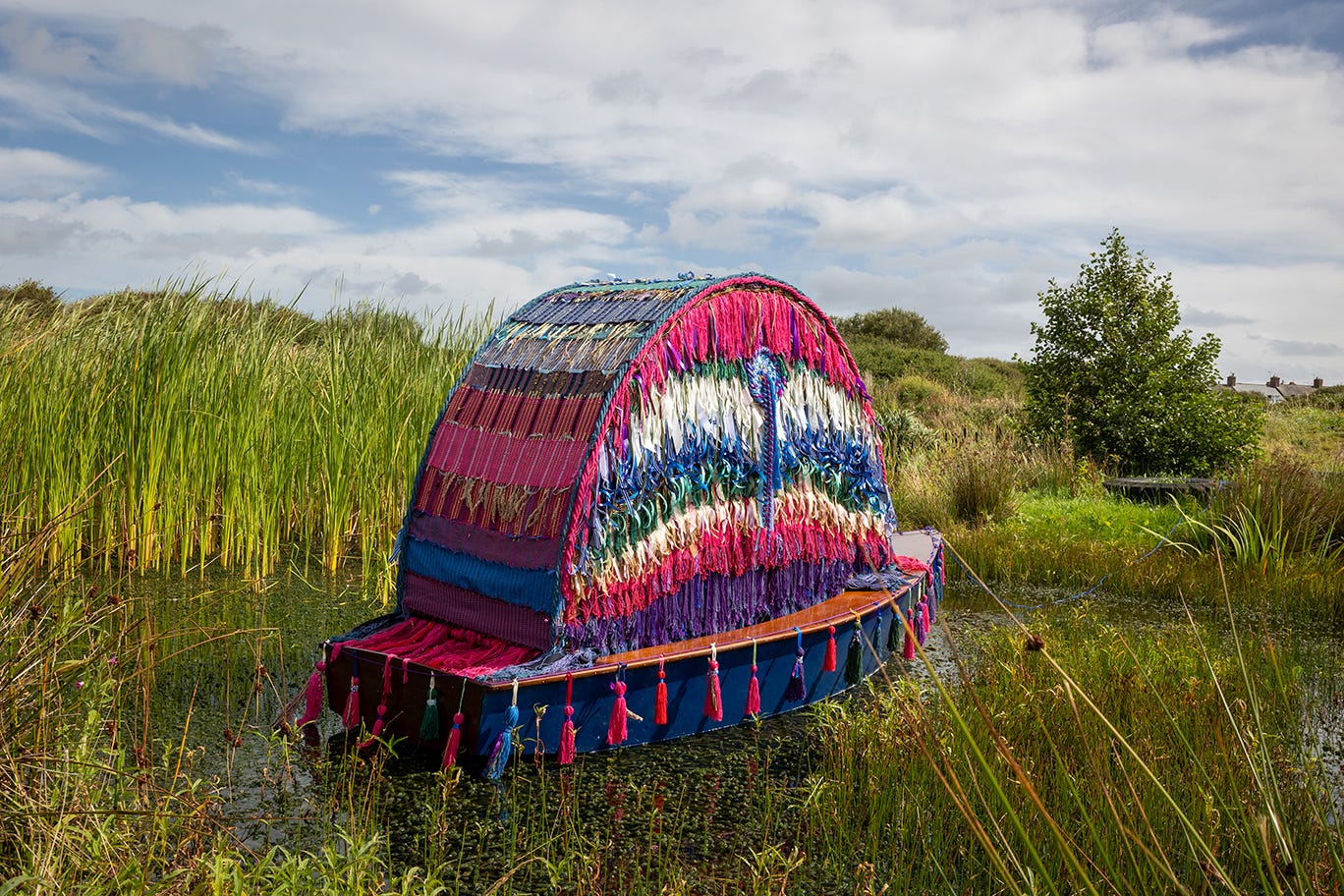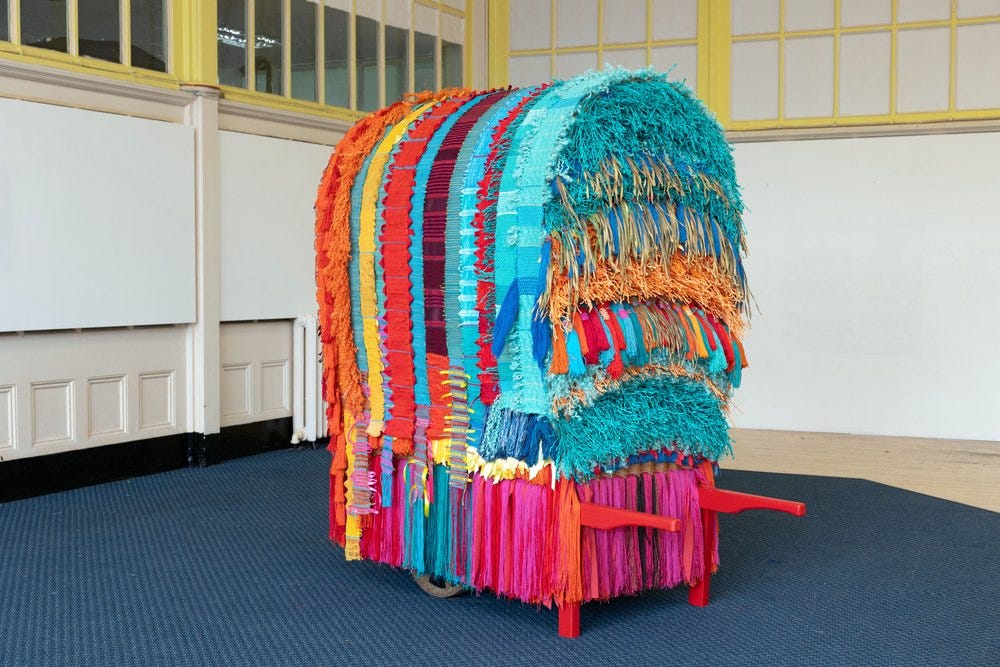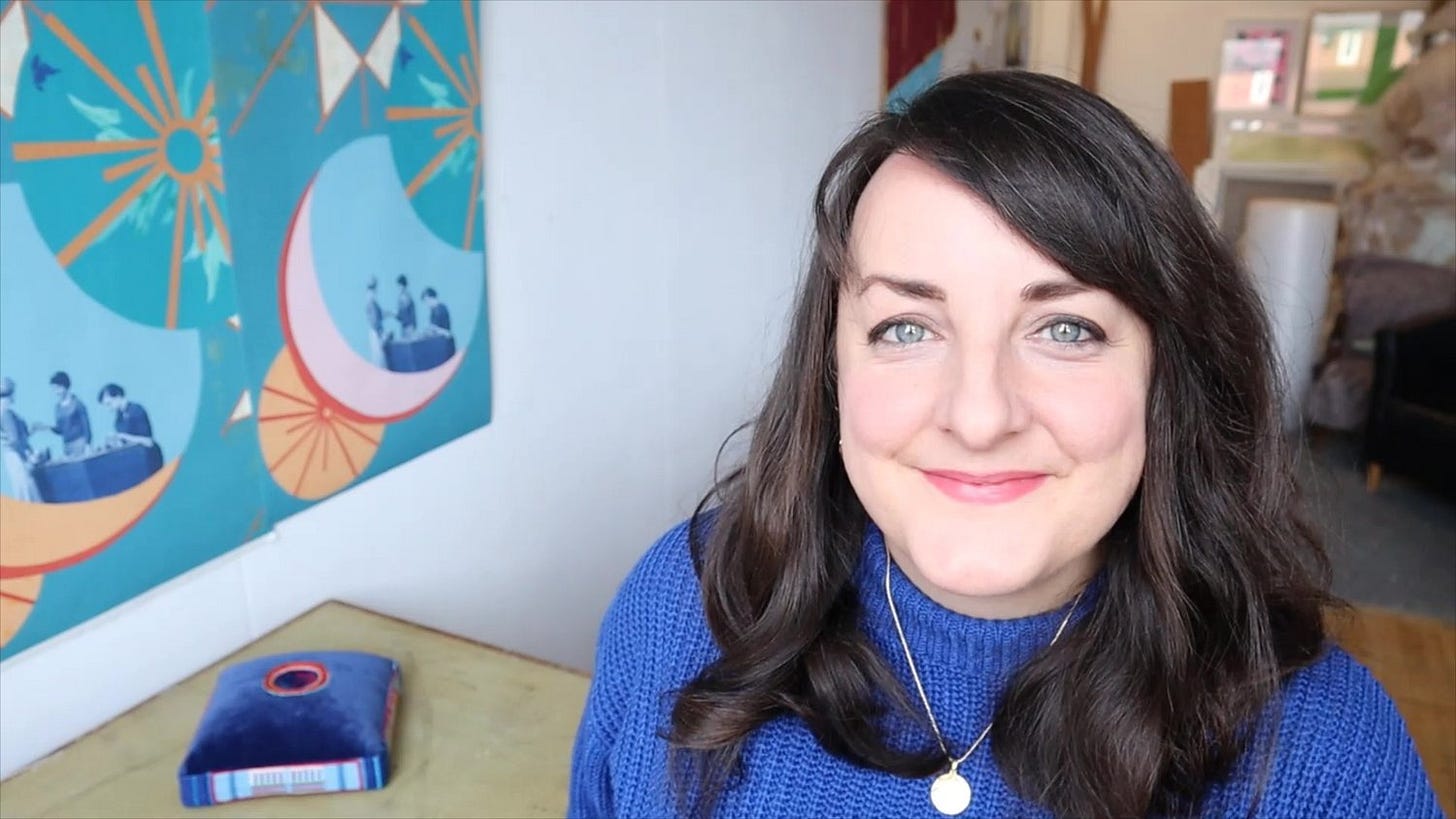Art, sustainability and community journalism
In a special Q&A session, artist Jenny Steele explains why sustainability is so important to her working practice
Good morning! We’re starting today with a glimpse into what’s coming up next week with our celebratory Indie News Week events and collaborations! But we’ve plenty more to tickle your fancy today including:
Meet the leading artist who puts sustainability at the heart of her work
Details about all the eco events for June
The role of salt marshes in tackling climate change
Indie News Week is nearly here! Under the banner of ‘No News is Bad News’, Indie News Week is a national campaign which gives us local journalists an opportunity to meet with communities, showing them who’s behind their local independent news outlet and what goes into accurately covering our stories.
This year we’re collaborating with South West Durham News to bring you some special reports and events by focussing our attention on County Durham. If you’re a local resident or business owner, we’d love to see you - please do pop into the newsroom, upstairs in the Shildon Town Council Building. It will be a chance to dive into how we create stories, choose formats, and stay accountable to you - we’d love to hear your stories, ideas and feedback.
But don’t worry if you’re further afield - we’ll still be bringing you plenty of news from across the region, as we always do!
What’s on the agenda
Along with almost 40 independent news organisations, we’ll be celebrating, campaigning and fundraising during the week. Here’s just a glimpse of what’s planned:
On Monday we’re producing a podcast: What is Indie News Week and Why Does it Matter? Archie from SWDN, Sarah from NE will be joined for this discussion by special guest, Beckie Shuker, Campaign and Communications Manager at the Public Interest News Foundation.
Tuesday: We’ll bring you a special report from The Northern Eco in which your attitudes to public land tidiness across County Durham are revealed.
Wednesday: 1pm-6pm we’re throwing open the doors of the newsroom and you’re invited. Pop into the offices on the first floor at the Town Council Offices, Civic Hall Square, Shildon, County Durham DL4 1AH. No need to make an appointment, just drop-in to see how we work and have a chat!
Thursday: Join us for a walk on Ferryhill Carrs. Meet at 11am on Cleves Avenue by Wood Lane for an informal wander for approx 1hour at the nature reserve.
Friday: Ferryhill Market Stall in the town centre between 9am and 3pm. We’d love to hear from you with any stories or ideas - or simply to say hello!
INW is hosted by The Public Interest News Foundation (PINF), the UK’s first charity to support public interest news – ethical and impartial journalism that informs and empowers the public about the things that matter to all of us.
Why we are doing this?
As well as giving our readers more of an insight into what goes into our journalism, the week is also an important opportunity to raise funds to keep the news flowing.
We’re so encouraged to see how much our community of subscribers has grown over the last two years. This tells us that the news we produce is relevant to you and that you feel part of a supportive community. We appreciate your feedback, which helps inform us where we need to focus more of our attention, and we also appreciate your ongoing support, without which we couldn’t continue to operate. We’re slowly getting closer to becoming sustainable but we’re not there yet, so please tell anyone you think would benefit from this newsletter to give us a try – especially as we’re running a membership promotion this month which means they can get 20% off an annual subscription.
🙏 Thank you, as always, for supporting The Northern Eco 🙏
If you can help, The easiest way to do that would be by a paid subscription - that costs £4.99 a month - just 16p a day!
OR for the next two weeks, get the 20% discount on an annual subscription by clicking here.
Alternatively, if you’re not keen on subscriptions, you could simply make a one-off donation towards our fundraising goal of £1,140. Why £1,140? Well, I worked out that it costs at least £114 to produce each of the newsletters so having the next ten paid for would be a massive help! If you know anyone who could be tempted to part with a few quid, it would be great if you're able to pass this link on.
Thanks again and hope to see you at one of our events next week.
Seeking sustainable ways to make art with textiles
Jenny Steele has been based in northern England for the past 14 years and is working hard to make the often wasteful textile industry more sustainable. Here she takes questions about her work.
Why are you looking at sustainability?
During the pandemic, it became increasingly important for me to use materials that are sustainable as possible for the environment. As an individual practitioner there is a large amount of waste and damaging carbon footprint in making creatively with textiles utilising fabrics, dyes, yarns and trimmings. Most materials required for fabricating artworks such as commissions and large-scale sculpture are purchased brand new from suppliers nationally and internationally, creating further negative impact via packaging and transportation.
As I am sure you are aware, textiles are the third largest form of landfill. There is significant negative effect of the textile industry caused through water pollution, landfill of discarded used fast fashion, unused textiles, and offcuts (Ref: An Environmental Crisis, OCS 2021). I do not want to not contribute to this damaging impact in any way.
What work have you produced in a sustainable way?

Combined with a new interest and skill in woven textiles using heritage techniques, during 2023-2024, I developed a new project ‘Rituals for Tomorrow’, funded by a project grant from Arts Council England. This was a research, engagement & production project to identify sustainable ways to use weaving with everyday wild plant life, that supports wellbeing, connection to nature and sense of belonging.
I worked with partners Art Gene, Barrow, Cumbria and Rogue Artists’ Studios, Manchester and a series of individual creative practitioners, to deliver a programme of weaving and wellbeing workshops on each site creating the development of two large scale artworks, Gorton Rush Cart and Charon using local flora and ex industrial yarns. A collection of short films sharing weaving techniques, plant life and personal narratives were created from the project and shared widely post project. Over the years, I have created a variety of permanent larger works using large scale printed textiles such as TEXTILE CITY, an installation for children at The Museum of Science and Industry, Manchester and The Joy of Union, for MET (Mobile Event Tent) for In Certain Places and City of Preston.
I noticed that your Gorton Rush Cart includes daffodil and crocus leaves - what’s that about?

As well as using locally sourced natural plants, such as willow, leaves and grasses which are annually cropped locally to increase biodiversity in the surrounding area, I use textile yarns that are discarded or diverted from landfill. I source these in a variety of ways. I predominantly work with Fairfield Yarns, Heywood, a yarn agent that sells a wide range of yarns, and some haberdashery which have been collected from industry suppliers. This stock is discontinued, has not sold or is unwanted due to business closure and would otherwise go to landfill. I also regularly collect unwanted materials from local textile contacts and a network of charity shops which advise me of acquired suitable stock for projects.
What’s next for you?
I am now focusing on adapting the approach of using locally sourced plant life and recycled textiles in current projects to lead a much more sustainable practice. Since September 2024, I have been working on a research residency with Rural Arts, Thirsk, where I have explored the heritage of traditional crafts in Yorkshire—focusing on rag rugging and corn dolly making. The current exhibition The Spirit of the Rag and The Corn at The Courthouse, Thirsk, proposes a large-scale community artwork that may be sited in their building in the future. The proposed piece will offer opportunities for the public to take part in its creation, rediscover the craft of ‘clippy’ or ‘peg’ rugs which used scraps of fabric for rugs and covers, and learn the endangered skills of corn dolly making. The artwork used discarded clothing and interior fabrics, and locally sourced straw to make the welcoming and colourful installation within the building’s interior.
There’s more information on Jenny Steele’s practice at her website www.jennysteele.co.uk
@jennycsteele (Instagram & X) and Facebook jennysteelestudio
In other news
⚡️ A new solar plan for farmland is prompting concern but renewable energy company Quintas Cleantech says the Wiswood solar farm would power the equivalent of 15,150 homes, reports Joe Willis.
💦 Save Our Swale is holding a fundraiser benefit from 7pm on Saturday June 14th at the Town Hall in Richmond. More details on this and all the other eco events we know about coming up in June can be found here.
💦 Yorkshire Water has been fined £350,000 over sewage in Foss Dike writes Alice Kavanagh at the York Press.
🌏 North Yorkshire’s Drax wood-burning power station should be forced to disclose full details of its tree consumption, campaigners have argued, as MPs review the billions in renewables subsidies the plant receives reports Fiona Harvey and Jillian Ambrose at The Guardian.
⛏️ A company extracting lithium from underneath remote countryside in County Durham says there are huge reserves of the mineral stored below the ground. The BBC’s Peter Harris reports that Northern Lithium says tests on a farm in Weardale showed there were "commercially viable" amounts in the area.
🪶 Nests for more than 1,000 kittiwakes could be installed on Scarborough’s Grand Hotel as part of a scheme to limit noise and mess from the birds, an expert has recommended, Anttoni James Numminen reports.
🪶 A colony of rare seabirds has made a welcome return to a North East beach - and visitors are being asked to play their part in protecting them by avoiding disturbing their nests, writes Oliva Howlett at The Northern Echo.
💨 Concerned County Durham residents fear a proposed new wind turbine would “tower over the landscape” and dwarf their village. Bill Edgar has more on the 'empty promises' and 'flawed' consultation over a giant Amazon wind turbine.
🌏 The UK's muddy saltmarshes are vital to tackle climate change, reports Victoria Gill, Science correspondent at BBC News.
🌿 The impact that the weedkiller glyphosate is having on people’s lives has been highlighted by the case of this 82 year old woman who says the controversial weedkiller has forced her to evacuate her home. Annabel Stock at The Argus covers that story. Meanwhile, we’re continuing with our In The Weeds campaign to have the herbicide banned from public spaces which you can follow here.
The three most clicked links from last week were:
That’s it for this week! Looking forward to seeing some of you during the events next week but in the meantime, don’t forget there are updates on the website and via social media through the week too.
Have a great week!






